Posts Tagged ‘Marketing’
101 What Motivates Entrepreneurs? w/ Jaime Masters
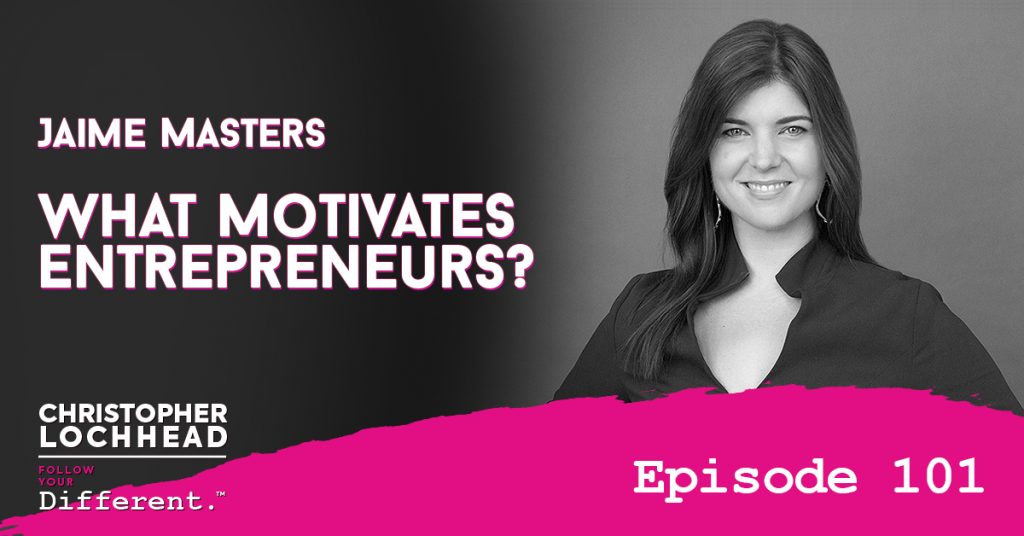
Podcast: Play in new window | Download (Duration: 1:28:48 — 81.5MB) | Embed
Subscribe: Apple Podcasts | Spotify | Pandora | RSS | More
Our guest today, Jaime Masters is an entrepreneurial coach and podcasting pioneer. She hosts “Eventual Millionaire” and she shares with us today some fun, practical and insightful learnings on what it takes to become a legendary entrepreneur.
She is an engaging business thinker who has her own quirks (love for costumes) and an amazing mother of two kids who are budding entrepreneurs.
From Tardy to Masters
Jaime Masters hosts the podcast Eventual Millionaire, where Christopher was once invited to promote his first book Play Bigger. She has interviewed close to 500 millionaires and she shares them through her book of the same title, Eventual Millionaire.
Jaime shares with us some funny and serious experiences she had when she started using her maiden name again. The name “Jaime Masters” is now a brand and she admits that she has no further intention of changing her name again, even when she remarries.
“It was something like, looking out when I’m 60, which person do I want to be? Which brand do I want to be building on my life?” – Jaime Masters
Her Kids Attend Entrepreneur School
It was a fun and admirable part of this episode when Jamie shared that her kids, a 12 and 10-year old, go to Entrepreneur School. The school has no homework and grades. They also do not have teachers, instead, they have guides. The school maximizes gamification for their modules.
“They’re learning 2x faster also, which is another thing the school wants. They learn life skills. My son video edited for my clients and is better than the editor that has been with me for 8 years.” – Jaime Masters
Part of teaching life skills, they are set to become entrepreneurs early as they are encouraged to sell products and services during their summer vacation. Jamie’s son went door-to-door with his pressure washer business and her daughter went to sell rosemary to neighbors.
“To me, the best thing about the school is, it’s about grit and pushing you out of your comfort zone. Teaching that at such a young age, not teaching memorization.” – Jaime Masters
Concerns and Motivations of Solopreneurs
Having interviewed around 500 millionaires, Jaime shares the inability to decide whether or not to hire a team is a common concern for them. Jaime further shares her process of assessing and diagnosing her clients’ concerns because sometimes, it is not a “team-problem” but an “owner-problem.”
Furthermore, she acknowledges the fact that most entrepreneurs want progress in their business. She reminded, however, her personal experiences of failing due to the wrong reasons.
“Knowing yourself really, really well is the best thing in entrepreneurship, even though it’s shitty. There are millions of holes that open up but thankfully, the holes to fill it are not achievement and materialism, which you’ll find out if you’re long enough in the game.” – Jaime Masters
To hear more about what motivates entrepreneurs and more relevant information about Jamie, download and listen to the episode. Why not try Wildz Casino free? It’s simple to do: follow the link to the website and you can register instantly using the bonus code that they provide. This online casino is a breath of fresh air in the world of online gambling. It is refreshing to see such a clean-cut and innovative design on an online casino website. Wildz offers players the chance to win big, with top prizes of $50k waiting to be won over and over again.
Bio:
Jaime Masters is a podcasting pioneer, host of the popular “Eventual Millionaire”, a Business Coach, Keynote Speaker, and Best Selling Author.
She’s been featured on:
CNNMoney, Yahoo’s homepage (6x), Business Insider, Inc, CNN Newsroom, Entrepreneur, Fox Business News, Success Magazine and Christopher Lochhead Follow Your Different.
Links:
We hope you enjoyed this episode of Follow Your Different™! Christopher loves hearing from his listeners. Feel free to email him, connect on Facebook, Twitter, Instagram and subscribe on iTunes!
013 Committees Kill Legendary Marketing
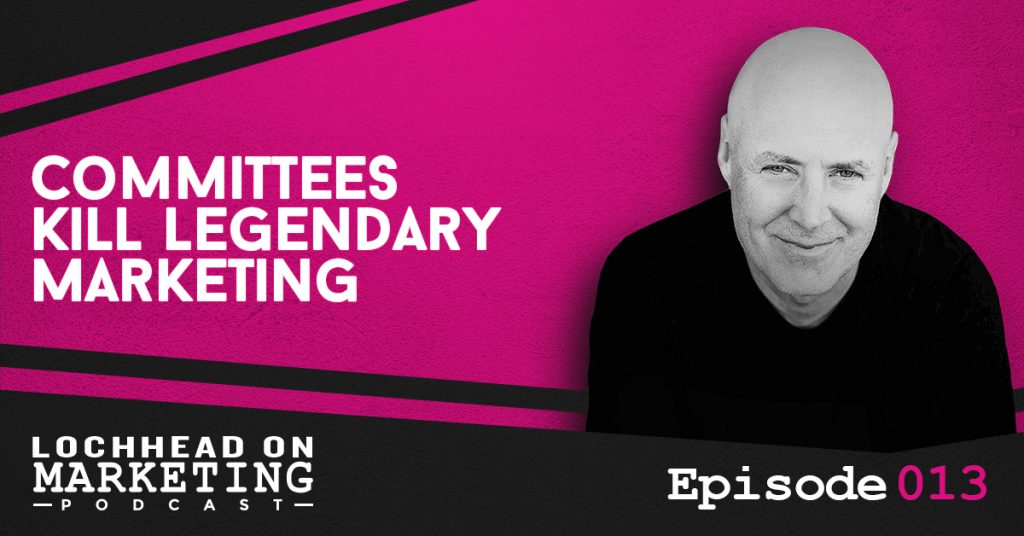
Podcast (lochheadonmarketing): Play in new window | Download (Duration: 12:30 — 11.5MB) | Embed
Subscribe: Apple Podcasts | Spotify | RSS | More
In today’s episode, Christopher gives us a rundown on why he thinks committees kill legendary marketing.
Why is so much marketing, shitty?
Christopher Lochhead candidly shares his honest observation on the industry today: a lot of marketing efforts suck. Aside from bad creatives, much of this onslaught of marketing stems from their inability to make a difference in designing and dominating a market category. Who’s to blame? Christopher says its the committees.
“This is probably true for most major initiatives in business, but it’s especially true in marketing because, fundamentally, legendary marketing is about leadership.” – Christopher Lochhead
To become the leader in your space — the category queen — a company must define and dominate a market niche. This not only holds true in tech companies but for almost all industries today. To dominate a market, every company’s objective should focus on building the company that wins, with a clear point of view on problem-solving.
The problem with committees
A famous automotive engineer and businessman, Charles Kettering, once said: “If you want to kill any idea in the world, get a committee working on it.” Why does committees hinder legendary marketing?
“The problem with most committees is that they are focused on process, not results.” – Christopher Lochhead
Committees generally try to incorporate everyone’s “feedback,” spend time “socializing ideas” and analyzing data. In the end, they are trying too hard to make everyone happy. Committees strive to be collaborative and ensure that all constituents have a say.
More issues with committees
A structural problem with many committees is that a lot of people can say no, while at the same time, they are not clear about who can say yes. By definition, if everybody agrees, that’s not a legendary idea.
“As a result, committees produce a compromise. They settle on the ideas that everyone could agree on. Not legendary ideas.” – Christopher Lochhead
Additionally, people involved in committees are oftentimes not subject matter experts themselves, which further leads to mediocre marketing efforts.
“It’s not about what people like, it’s about what’s gonna work. Particularly what’s gonna work through the lens. Will these help us design and dominate a giant category that matters and take 2/3 of the economics?” – Christopher Lochhead
To hear more about committees kill legendary marketing and more relevant information from Christopher Lochhead, download and listen to the episode.
Bio:
Christopher Lochhead is a Top 25 podcaster and #1 Amazon bestselling co-author of books: Niche Down and Play Bigger.
He has been an advisor to over 50 venture-backed startups; a former three-time Silicon Valley public company CMO and an entrepreneur.
Furthermore, he has been called “one of the best minds in marketing” by The Marketing Journal, a “Human Exclamation Point” by Fast Company, a “quasar” by NBA legend Bill Walton and “off-putting to some” by The Economist.
In addition, he served as a chief marketing officer of software juggernaut Mercury Interactive. Hewlett-Packard acquired the company in 2006, for $4.5 billion.
He also co-founded the marketing consulting firm LOCHHEAD; was the founder/CMO of Internet consulting firm Scient, and served as head of marketing at the CRM software firm Vantive.
Link:
We hope you enjoyed this episode of Lochhead on Marketing™! Christopher loves hearing from his listeners. Feel free to email him, connect on Facebook, Twitter, Instagram and subscribe on iTunes!
099 Persuasion w/ Lee Hartley Carter
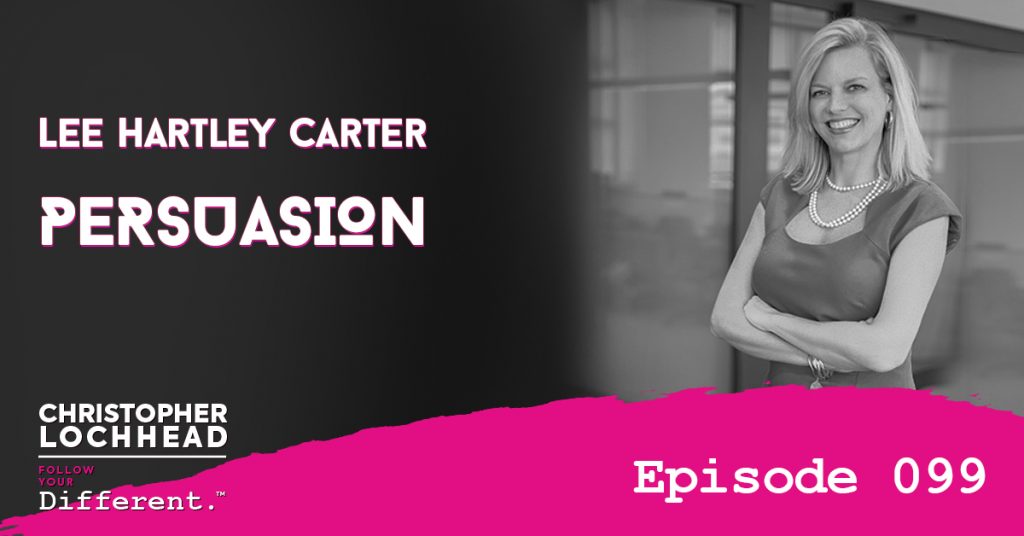
Podcast: Play in new window | Download (Duration: 1:16:30 — 70.3MB) | Embed
Subscribe: Apple Podcasts | Spotify | Pandora | RSS | More
Languaging Master Lee Hartley Carter joins us today for a riveting conversation about the power of language and the art of persuasion. She discusses today how language shapes everything in our lives and how to use language to convince people when facts don’t seem to matter.
Marketers and non-marketers will surely learn a ton from this conversation about communications, language strategy, and persuasion.
The Power of Language
Lee candidly shares with Christopher that she never thought about a job opportunity which involves words and messaging. When she was younger, she considers herself as obsessed with words.
For her, language is the means in which people can connect with other human beings and convey thoughts, feelings, and perspectives. Language is a powerful tool with every word, having its own meaning.
“That change in language changes thinking, which ultimately change social beliefs and norms and potentially laws and governance approaches. It can change a lot of things.” – – Lee Hartley Carter
Language Strategy in Marketing
Lee further cites examples of how the smallest change in language can have a huge impact. She cited differences in words such as estate tax/death tax, or global warming/climate change, or used vehicles/pre-owned vehicles. A simple change of words can reshape how people think about the message.
Lee also shared the common mistake marketers make in conveying a message. Oftentimes, marketers tend to “speak louder” — to share more facts to try and get the point across. This doesn’t end well, as people get turned off with the over-communication.
“Instead, what you need to do is to not speak louder but speak smarter. The way that speaks smarter is by slowing down and really saying ‘you know what, this isn’t about what I want to say. This is about what they need to hear.’” – Lee Hartley Carter
Crisis Communications
In an interesting turn of the conversation, Lee and Christopher discussed crisis response. Lee laid out her step by step advice on companies facing a crisis. First, she says that freaking out is a natural response to a crisis. However, she noted that it’s important to understand what your target audience is thinking or is feeling at that moment.
“Who are you trying to convince right now that you’re okay, is it your shareholders? is it your customers? What are they afraid of right now? What value have you just betrayed in them?” – Lee Hartley Carter
They had a great dialogue on crafting emergency messages as Christopher had his own fair share of stories to tell, with regards to crisis communications and response.
To hear more about Persuasion and more relevant information about Lee Hartley Carter, download and listen to the episode.
Bio:
After a crushing loss in a student council race in the 6th grade, Lee learned the importance of getting the story right from the beginning.
In the 7th grade, when she ran again, she ran on a story that was driven by some middle school polling techniques she employed among her classmates.
And, she won.
Ever since she has had a passion for language. For the message. For the story.
And she brings this passion to her role as partner at m+p, a research-driven language strategy firm that specializes in finding the right language and messages based on one simple idea: it’s not what you say that matters, it’s what they hear.
A member of the executive leadership team, Lee oversees a diverse range of language strategy work for Fortune 500 companies and non-profits in the U.S. and abroad.
To do this, Lee has conducted, overseen, and analyzed countless instant response sessions, traditional focus groups, brainstorming and strategy sessions. and surveys in more than 15 countries.
She has worked with clients in a wide range of industries including financial services, energy, automotive, sustainability, hospitality services, food and beverage, technology, and consumer products.
And, she has worked extensively in public affairs, public policy, and issue advocacy.
Before joining Maslansky + Partners, Lee spent more than ten years in marketing and strategic communications.
And, like many of her colleagues at m+p got her start in politics advocating for teaching hospitals, graduate medical education, the use of bicycle helmets, and healthcare for those who couldn’t afford it.
Lee serves as a member of the National Head Start Association advisory board focusing on messaging, is a fellow of the National Committee on US-China Relations Young Leadership Forum, and an occasional contributor to Fox News and MSNBC.
Links:
We hope you enjoyed this episode of Follow Your Different™! Christopher loves hearing from his listeners. Feel free to email him, connect on Facebook, Twitter, Instagram and subscribe on iTunes!
011 The Perception of Your Product is Your Product
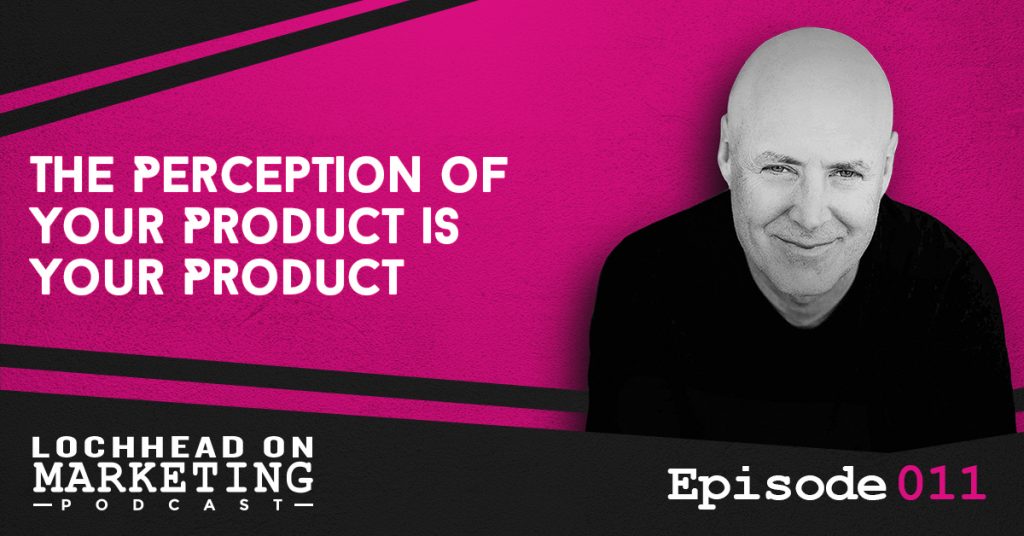
Podcast (lochheadonmarketing): Play in new window | Download (Duration: 9:13 — 8.5MB) | Embed
Subscribe: Apple Podcasts | Spotify | RSS | More
In this episode. Christopher Lochhead talks about what your real product or real service is. He discusses why product development and marketing should team because the perception of your product is your product.
Marketing Defined
One CEO, who is also a good friend of Christopher, once stated that “Marketing is what you do when you have a shitty product.” He was telling Christopher about their competitor who had a significantly inferior product but is, at that time, out-marketing them. Additionally, quite a lot of people in Silicon Valley also think this way.
Wikipedia defines marketing and product as such: “In marketing, a product is an object or system made available for consumer use; it is everything that can be offered to a market to satisfy the desire or need of a customer.”
“I actually don’t want to disagree with Wikipedia, but I do want to propose a different perspective. Your real product, your real service, is people’s perception of your product and service.” – Christopher Lochhead
The People’s Perception of Your Products
Christopher asserts that your product and service is not your product, but what people say it is, think it is and feel about it. He thinks that what other people say about the product or the service, is the truth, regardless if we think of it as true or not.
He cites examples such as Harley Davidson and Jack Daniels. These brands may not be the most efficient in performance or the most premium whiskey available, but they have made a mark in the minds and the hearts of consumers. In fact, they are considered category kings.
However, Christopher also cited instances when people’s perceptions of product change, such as that of Facebook and Boeing 737 MAX. They can fix their products but the perceptions will take forever to change.
The “Perception Manufacturing Business”
Christopher believes that we are in the “perception manufacturing business.” Further, he mentions that not only does the perception of the product more important than the product itself, but it is also actually what the developer is building when he builds and market the products.
“You don’t make products, you make perceptions about products. That is why legendary marketing is equally important to building legendary products.” – Christopher Lochhead
In conclusion, Christopher says that product engineering, product development, and marketing need to come together. They must realize that they are in the “perception manufacturing business.”
“It is ludicrous to say marketing is what you do when you have a shitty product. Marketing is what you do when you have a legendary product and you want people to perceive it as such.” – Christopher Lochhead
To hear more about the Perception of Your Product is Your Product and more relevant information from Christopher Lochhead, download and listen to the episode.
Bio:
Christopher advised over 50 venture-backed startups. He is a venture capital limited partner and a former three-time Silicon Valley public company CMO, entrepreneur. In addition, he co-authored two bestsellers: Niche Down and Play Bigger.
After he flunked school, with few other options, Christopher started his first company at the age of 18.
He was a chief marketing officer of software juggernaut Mercury Interactive. Hewlett-Packard, in 2006, acquired that company for $4.5 billion.
Further, he also co-founded the marketing consulting firm LOCHHEAD. Christopher was the founder/CMO of Internet consulting firm Scient. He also served as head of marketing at the CRM software firm Vantive.
Christopher loves his family and friends. He thinks the Ramones are legendary and loves riding the mountains and waves of Northern California.
We hope you enjoyed this episode of Lochhead on Marketing™! Christopher loves hearing from his listeners. Feel free to email him, connect on Facebook, Twitter, Instagram and subscribe on iTunes!
010 Artificial Intelligence In Marketing
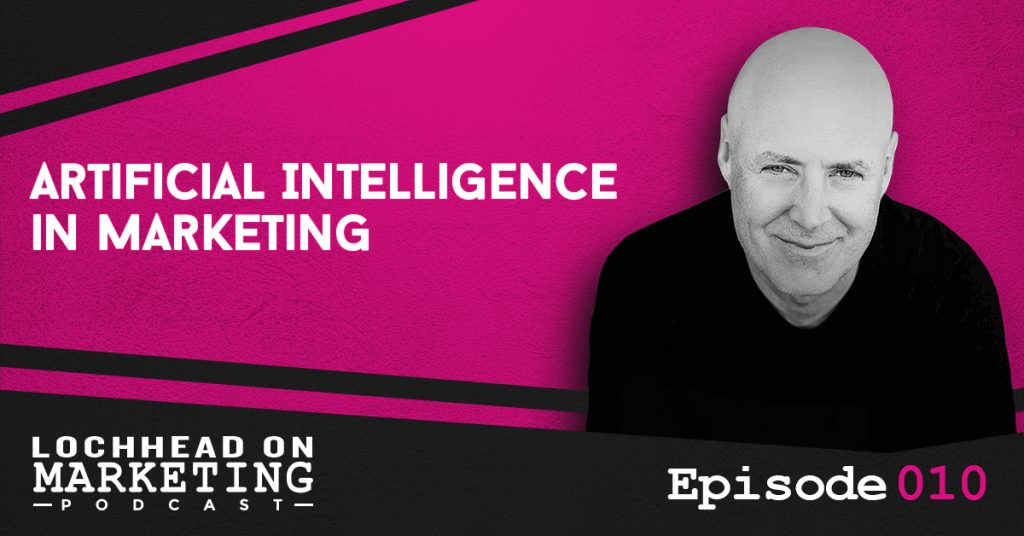
Podcast (lochheadonmarketing): Play in new window | Download (Duration: 12:51 — 11.8MB) | Embed
Subscribe: Apple Podcasts | Spotify | RSS | More
In this episode, Christopher Lochhead shares two eye-opening stories about Artificial Intelligence in Marketing. First is about Nike buying an AI marketing analytics company and second, Chase Bank using AI to write marketing copies. He further discusses how these two leverages technology to produce massive results.
Nike Acquires AI Startup
Tech Crunch reported that Nike announced its acquisition of the Boston-area startup Celect. This is to help Nike beef up its predictive analytics strengths. The startup’s tech focuses on delivering data insights based on structured and unstructured retail data.
“What we do know is Nike spent a lot of money to get their hands on a company that specializes in crunching a shit ton of data, of many thousands of customers, to anticipate their needs going forward.” – Christopher Lochhead
Christopher noted that this move of a giant brand has never happened in the past. In conclusion, this proves that analytics plays a huge role in Marketing. AI provides marketers data on customer’s wants and needs — even before they do.
“What kind of big data analytics and AI are we using to understand our market categories and what might we do in this area?” – Christopher Lochhead
AI Machines Outperforming Humans
AdAge published an experiment that they conducted about the bank company Chase. They compared the advertising copies written by humans versus that of AI technology. The result is: AI outperformed humans — with higher consumers clicking on the copy written by an AI machine.
“The folks at Chase Bank entered a five-year agreement with this company Persado to use machine learning to write their ad copy.” – Christopher Lochhead
The Implications of AI Marketing
Legendary marketers should always be experimenting with both the art and the science of marketing.
“We’re gonna see more companies benchmarking the two — whether ad headlines and copy, logo design and a lot of other creative things. What many of us in marketing thought technology wouldn’t touch — are now being touch by that.” – Christopher Lochhead
As the lines of Science and Art blur, Christopher calls out to fellow Creative professionals to stay in tune with technology. Never be complacent about our jobs because AI is coming to replace everything. The best action to do at the moment is to leverage this technology and not to resist it.
“Leverage the science and be super strategically creative at the same time.” – Christopher Lochhead
To hear more about Artificial Intelligence Marketing and more relevant information from Christopher Lochhead, download and listen to the episode.
Bio:
Christopher advised over 50 venture-backed startups. He is a venture capital limited partner and a former three-time Silicon Valley public company CMO, entrepreneur. In addition, he co-authored two bestsellers: Niche Down and Play Bigger.
After he flunked school, with few other options, Christopher started his first company at the age of 18.
He was a chief marketing officer of software juggernaut Mercury Interactive. Hewlett-Packard, in 2006, acquired that company for $4.5 billion.
Further, he also co-founded the marketing consulting firm LOCHHEAD. Christopher was the founder/CMO of Internet consulting firm Scient. He also served as head of marketing at the CRM software firm Vantive.
Christopher loves his family and friends. He thinks the Ramones are legendary and loves riding the mountains and waves of Northern California.
Link:
Nike buys an AI startup that predicts what consumers want
Chase Commits To Ai After Machines Outperform Humans In Copywriting Trials
We hope you enjoyed this episode of Lochhead on Marketing™! Christopher loves hearing from his listeners. Feel free to email him, connect on Facebook, Twitter, Instagram and subscribe on iTunes!
009 Marketing Strategy vs. Tactics
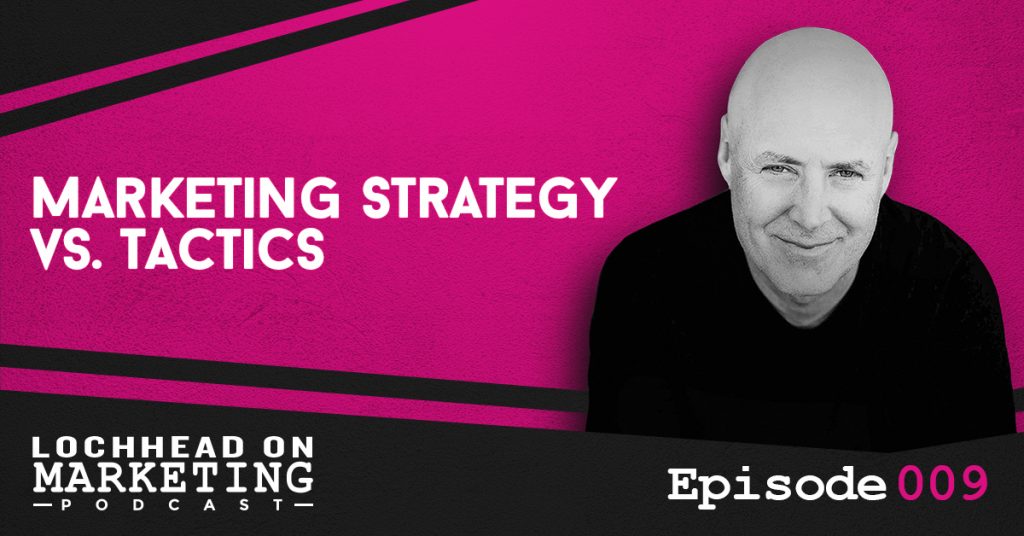
Podcast (lochheadonmarketing): Play in new window | Download (Duration: 4:40 — 4.3MB) | Embed
Subscribe: Apple Podcasts | Spotify | RSS | More
The difference between Marketing Strategy and Tactics, oftentimes, confuses most people. In this episode of Lochhead on Marketing, Christopher Lochhead talks about some of the pressing questions people have on strategy and tactics.
Quoting Dushka Zappata
A good friend of Lochhead, Senior Communication and PR Executive Dushka Zappata helps shine a light on this confusion marketers have about strategy and tactics. She has 20 years experience in the tech industry and she amassed 140 million views in Q&A site Quora with her writing.
Strategy
Dushka Zappata answered the distinction between strategy and tactics. According to her, strategy answers the question “why?” To give an example for this, one may ask, “why are we doing this, why do we think it’s a good idea?”
“For strategy, the answer should be a blend of data, understanding of trends and creativity.” – Dushka Zappata
Tactics
She further continued that tactics, on the other hand, answers the question “how.” This pertains to questions such as, “how will we get this done,” “what are the actions needed” and “what will get executed.”
Working on your marketing strategy and tactics need not be confusing. To be clear, strategy answers, “why,” and tactics answers, “how.”
To hear more about Marketing Strategy vs. Tactics and more relevant information from Christopher Lochhead, download and listen to the episode.
Bio:
Christopher Lochhead is a Top 25 podcaster and #1 Amazon bestselling co-author of books: Niche Down and Play Bigger.
He has been an advisor to over 50 venture-backed startups; a former three-time Silicon Valley public company CMO and an entrepreneur.
Furthermore, he has been called “one of the best minds in marketing” by The Marketing Journal, a “Human Exclamation Point” by Fast Company, a “quasar” by NBA legend Bill Walton and “off-putting to some” by The Economist.
In addition, he served as a chief marketing officer of software juggernaut Mercury Interactive. Hewlett-Packard acquired the company in 2006, for $4.5 billion.
He also co-founded the marketing consulting firm LOCHHEAD; was the founding CMO of Internet consulting firm Scient, and served as head of marketing at the CRM software firm Vantive.
Link:
We hope you enjoyed this episode of Lochhead on Marketing™! Christopher loves hearing from his listeners. Feel free to email him, connect on Facebook, Twitter, Instagram and subscribe on iTunes!
008 7 Recession Marketing Ideas
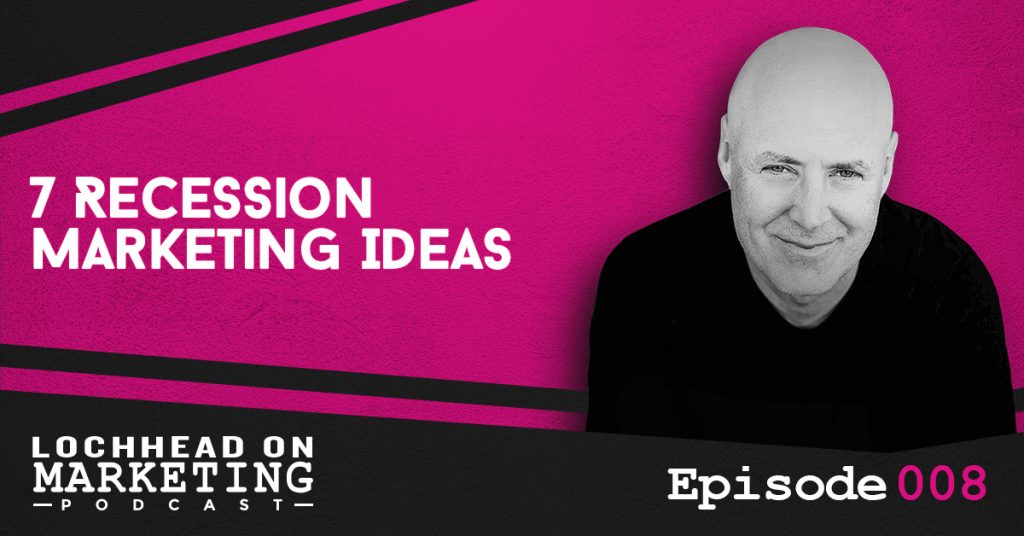
Podcast (lochheadonmarketing): Play in new window | Download (Duration: 20:45 — 19.1MB) | Embed
Subscribe: Apple Podcasts | Spotify | RSS | More
Christopher Lochhead discusses some of his marketing ideas timely for a potential (we hope not, but economists say otherwise) recession. Here are 7 recession marketing ideas for our listeners that you might want to consider for your business.
1. Never Let A Good Recession Go To Waste!
History proved that recessions are the impetus for change. With change comes both threats and opportunities. Ordinary business people usually panic and focus on threats. However, legendary marketers focus on both. Recessions are a great excuse for taking action, especially those that should have been taken anyway.
“Get on your recession planning now! Do not wait for the recession to happen. Get on it, regardless of whether or not we’re going to have a recession. They are great excuse to tighten up shit on your ship!” – Christopher Lochhead
2. Assume you can’t raise any more money
Recession talks are best paired with the assumption that there is no money available for lending — no more VCs, bank loans, operating lines or rich uncles. If you do raise equity or debt, expect that your valuation or market cap is likely coming down, so you will have to give up more equity to raise VC. Likewise your costs to service loans or operating lines is going up.
“Focus on your cash and remember that paying customers are your best VCs, your best bankers.” – Christopher Lochhead
3, Measure twice, cut once
Go through your marketing plans and budget with a magnifying glass. Christopher advises to categorize every single investment — either one time or on-going investments — into three buckets: must do, good to do, nice to do.
“Do not have more than a 3rd of your investments in ‘Must Do.’ Find at least 10% of your investments that you can cut now. If you want to get aggressive, find 25%. Plan to cut or re-deploy at least 5%, no matter what happens – recession or not.” – Christopher Lochhead
4. Brainstorm short-term ways to increase revenue
Come up with some packages or offerings you can promote to your best customers now. Brainstorm around 25 ideas on how to increase revenue immediately. Ideas that aims to provide customers with an incentive to buy more from you right now are the key to this before they start cutting back spending hard.
5. Market & Sell Into The Whitespace
Get a list of all of your existing customers and figure out which customers, own / use which of your products and services. This is to identify the white space or which customers are not users of all of your offerings.
6. Consider a competitor trade-in.
Recessions are a unique opportunity to destroy your completion.
7. Double Down on Your Category
This is an area you should focus on a recession. Chances are, most of your competition is going to panic and they most likely will over-cut marketing. Take advantage of the lower cost of marketing and go hard on content marketing, especially in social media.
“Your prospects and customers will be hearing less noise. Take advantage of this, to evangelize your category point-of-view. Become more visible, while your competition is hiding under a desk, asking for their mommies.” – Christopher Lochhead
Bio:
Christopher Lochhead is a Top 25 podcaster and #1 Amazon bestselling co-author of books: Niche Down and Play Bigger.
He has been an advisor to over 50 venture-backed startups; a former three-time Silicon Valley public company CMO and an entrepreneur.
Furthermore, he has been called “one of the best minds in marketing” by The Marketing Journal, a “Human Exclamation Point” by Fast Company, a “quasar” by NBA legend Bill Walton and “off-putting to some” by The Economist.
In addition, he served as a chief marketing officer of software juggernaut Mercury Interactive — which was acquired by Hewlett-Packard in 2006 for $4.5 billion.
He also co-founded the marketing consulting firm LOCHHEAD; was the founding CMO of Internet consulting firm Scient, and served as head of marketing at the CRM software firm Vantive.
Link:
We hope you enjoyed this episode of Lochhead on Marketing™! Christopher loves hearing from his listeners. Feel free to email him, connect on Facebook, Twitter, Instagram and subscribe on iTunes!
7 Recession Marketing Ideas
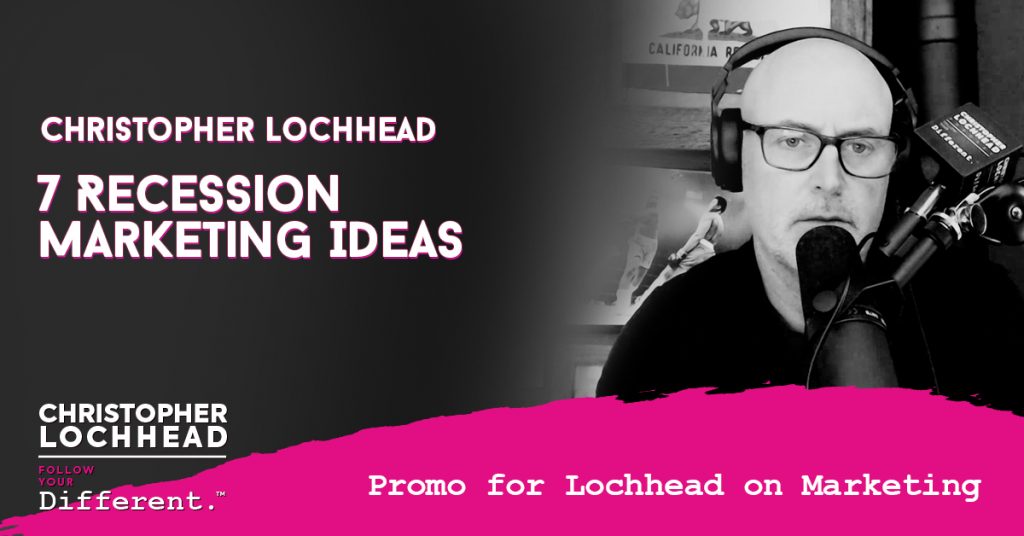
Podcast: Play in new window | Download (Duration: 1:29 — 1.4MB) | Embed
Subscribe: Apple Podcasts | Spotify | Pandora | RSS | More
Christopher Lochhead discusses, in his newly launched podcast, Lochhead on Marketing talks about some of his ideas timely for a potential recession.
With this threat coming, Christopher points out the importance of developing and acting on ideas that would make your companies survive this disastrous event. He hopes that through these suggestions, your company will come out even come out stronger from a potential recession.
Without further adieu, here are Christopher’s 7 Recession Marketing Ideas
- Never Let A Good Recession Go To Waste!
- Assume you can’t raise any more money
- Measure twice, cut once
- Brainstorm short-term ways to increase revenue
- Market & Sell Into The Whitespace
- Consider a competitor trade-in
- Double Down on Your Category
You can check out Lochhead Marketing Podcast on Lochead.com or any podcast player that you and listen to episode 008 7 Recession Marketing Ideas.
Links:
We hope you enjoyed this episode of Follow Your Different™! Christopher loves hearing from his listeners. Feel free to email him, connect on Facebook, Twitter, Instagram and subscribe on iTunes!
006 Peanut Butter vs. Lightning
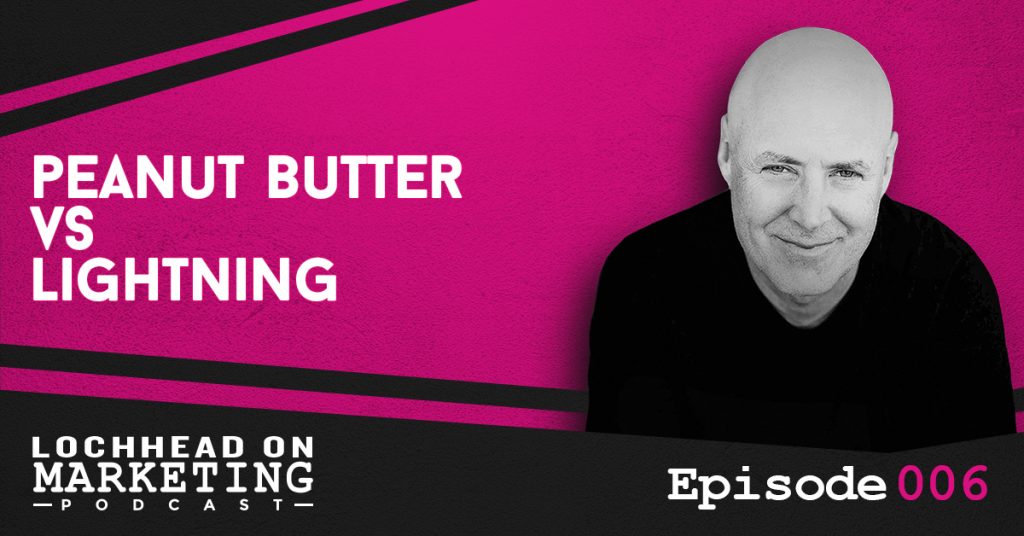
Podcast (lochheadonmarketing): Play in new window | Download (Duration: 11:57 — 11.0MB) | Embed
Subscribe: Apple Podcasts | Spotify | RSS | More
In this episode, Christopher Lochhead looks into the age-old marketing approach of peanut butter marketing and why it is not an applicable strategy in today’s world. Instead, he introduces us to the concept of lightning marketing, as mentioned in his first book “Play Bigger.”
PB and Lightning Defined
In Lochhead’s book “Play Bigger,” he defined the terms Lightning Strike and Peanut Butter marketing. With the traditional Peanut Butter approach, marketers spread the marketing and PR across all sorts of markets—over a long period of time—with the hopes that somewhere, somewhat, the message would “stick.”
“Peanut butter marketing does not break through in this era of ca-co-pho-nous media and never-ending swarms of new start-ups seeking attention. A lightning strike must overcome the noise.” – Christopher Lochhead
In today’s society—where ads are all over social media, television, radio, and print media—most people consider Peanut Butter marketing as noise. This definitely calls for a different kind of approach, hence, a lightning strike.
“A Lightning Strike is an event meant to explode onto the market, grab the attention of customers, investors, analysts, and media, and make any potential competitors crap their drawers. It is the full concentration of the company’s resources on a high-intensity strike.” – Christopher Lochhead, Play Bigger
Ground Wars and Air Wars
Lochhead quotes more information from his book, this time, about ground wars and air wars. Air-wars is a campaign to change potential customers’ minds so they would consider buying from the company. On the other hand, ground wars refer to more hand-to-hand work such as lead generation, sales, calls, and closing deals.
“Some companies know they need both air wars and ground wars to move their target’s brains so they then move their buying patterns. Lighting strike gets air wars off with a resounding bang. One of the best strikes is to hijack an event—an industry conference or trade show—where a good number of the target audience will be gathered.” – Christopher Lochhead, Play Bigger
It is a Company Event
Lochhead further shares that the most important thing to understand about a lightning strike is: it’s not a marketing event, it’s a company event. It becomes a forcing function for every part of the company.
“Once the work is done to define the category and set up the vision, the lightning strike is meant to show the world that the category and vision are real, imminent, and inevitable.” – Christopher Lochhead
He gives further advise on strategies when to best employ the lightning strike approach.
To hear more about Peanut Butter vs. Lightning and more relevant information from Christopher Lochhead, download and listen to the episode.
Bio:
Christopher Lochhead is a Top 25 podcaster and #1 Amazon bestselling co-author of books: Niche Down and Play Bigger.
He has been an advisor to over 50 venture-backed startups; a former three-time Silicon Valley public company CMO and an entrepreneur.
Furthermore, he has been called “one of the best minds in marketing” by The Marketing Journal, a “Human Exclamation Point” by Fast Company, a “quasar” by NBA legend Bill Walton and “off-putting to some” by The Economist.
In addition, he served as a chief marketing officer of software juggernaut Mercury Interactive — which was acquired by Hewlett-Packard in 2006 for $4.5 billion.
He also co-founded the marketing consulting firm LOCHHEAD; was the founding CMO of Internet consulting firm Scient, and served as head of marketing at the CRM software firm Vantive.
Link:
We hope you enjoyed this episode of Lochhead on Marketing™! Christopher loves hearing from his listeners. Feel free to email him, connect on Facebook, Twitter, Instagram and subscribe on iTunes!

